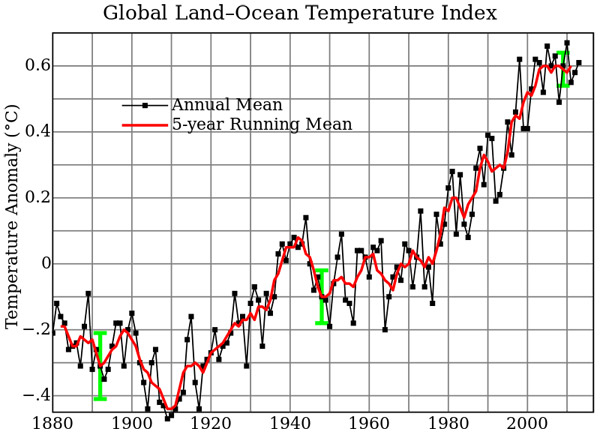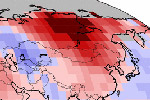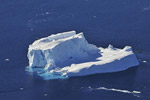This April was notable for being the 350th month in a row where temperatures exceeded the 20th Century average. This means, monthly global temperatures have not fallen below average for even a single month since February 1985.
In fact, the National Oceanic and Atmospheric Administration (NOAA) found that April 2014 was tied with 2010 for the warmest on record going back to 1880.In all this April was 0.77 degrees Celsius (1.39 degrees Fahrenheit) above the 20th Century average. While portions of the U.S., Canada, and Central Asia were below average, Europe, Australia, the Middle East, northern Africa, and Siberia were significantly above.
As the Earth has warmed rapidly over the last century due to burning fossil fuels, so has the continued probability of each month being warmer than a longterm average. Since the late 19th Century, the world has warmed about 0.8 degrees Celsius (1.44 degrees Fahrenheit), but future warming largely depends on how quickly global society combats greenhouse gas emissions.
Countries worldwide have pledged to keep warming from exceeding 2 degrees Celsius (3.6 degrees Fahrenheit), although some experts warn even this target is to high.
According to scientists, nations have moved slowly in tackling global warming with greenhouse gas emissions continue to rise unabated. Progress may be coming though: the U.S. just announced a long-awaited policy to cut CO2 emission from power plants while China says it will set a absolute cap on its own emissions. Countries are expected to come up with a new international agreement on climate change in Paris, 2015.

Aprils from 1880 to today. Graph courtesy of NOAA.

Global mean temperatures from land surface and oceans. Black line is each year, while the red line is 5-year-averages. Graph courtesy of NASA-GISS.
Related articles
Turning point? U.S. and China announce major actions on global warming
(06/03/2014) Could 2014 be a turning point for efforts to slash global greenhouse gas emissions? Maybe: in less than 24 hours the world’s two largest emitters of carbon dioxide announced plans to finally rein-in the gas most responsible for global warming.
Animals bark, screech, and howl for action on global warming (PHOTOS)

(06/02/2014) On May 22nd, zoos and aquariums around the world creatively called for action on global warming. Dubbed ‘Show the Wild Face of Climate Change,’ the event involved over 70 institutions from 25 countries on all seven continents.
Upcoming EPA Proposal could put America back on track to lead on global warming

(05/27/2014) A regulation proposal on coal plants that the U.S. Environmental Protection Agency (EPA) will release in June could be great news for the climate change initiative. The EPA rolled out tough regulations on new constructions of electric generation facilities in January, but the nation’s 1,500 existing power plants were left unaffected.
April ties for warmest on record

(05/27/2014) Globally, this April was a scorcher, tying with 2010 for the warmest April on record, according to new data released by the National Oceanic and Atmospheric Administration (NOAA) last week. This makes 2014, to date, the sixth warmest year on record going back to 1880 when comparing the first four months.
Extreme cold and drought in U.S. linked to climate change

(05/23/2014) The U.S. Midwest and Northeast experienced one of the coldest, snowiest winters on record this past season. This might seem contrary to warming trends forecast by climate scientists, but a new analysis released today in Science points out that climate change caused by greenhouse gas emissions may actually have contributed to the well-below average temperatures seen in parts of the U.S.
Climate change’s ominous secret

(05/21/2014) Climate change is happening and humans are causing it, primarily from the increase in atmospheric carbon dioxide caused by burning fossil fuels. This much we know. The ‘secret’ comes from changes happening in the fast-warming Arctic: we may be surprisingly close to an Earth that supports far fewer humans than it does today.
Tipping point already reached? West Antarctica in slow-motion, unstoppable melt

(05/14/2014) Two hundred years from now, the planet could look very different. This week two landmark studies revealed that West Antarctica’s ice sheet is in a state of seemingly inevitable collapse linked to climate change. The slow-motion collapse would by itself eventually lead to a rise in global levels of 3.6-4.5 meters (12-15 feet).
Featured video: John Oliver skewers media ‘balance’ on climate science in viral video
(05/13/2014) Sometimes you need comedians to tell the truth. On his new show, Last Week Tonight, comedian John Oliver took on the poor state of media reporting on climate science.














